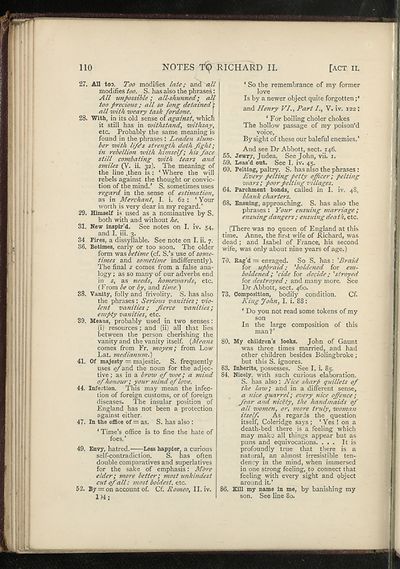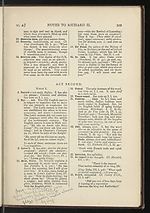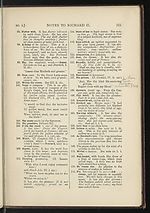Download files
Complete book:
Individual page:
Thumbnail gallery: Grid view | List view

110
NOTES TQ RICHARD II. [act ii.
27. All too. Too modifies late: and all
modifies too. S. has also the phrases:
All impossible; all-shunned; all
too precious ; all so long detained;
all with weary task fordone.
28. With, in its old sense of against, which
it still has in withstand, withsay,
etc. Probably the same meaning is
found in the phrases : Leadeti slum¬
ber with life’s strength doth fight;
in rebellion with himself; his face
still combating with tears and
smiles (V. ii. 52). The meaning of
the line .then is : ‘ Where the will
rebels against the thought or convic¬
tion of the mind/ S. sometimes uses
regard in the sense of estimation,
as in Merchant, I. i. 62 : 4 Your
worth is very dear in my regard. ’
29. Himself is used as a nominative by S.
both with and without he.
31. New inspir’d. See notes on I. iv. 54,
and I. iii. 3.
34 Fires, a dissyllable. See note on I. ii. 7.
36. Betimes, early or too soon. The older
form was betime (cf. S.’s use of some¬
times and sometime indifferently).
The final s comes from a false ana¬
logy ; as so many of our adverbs end
in s, as needs, homewards, etc.
(From be or by, and time.)
38. Vanity, folly and frivolity. S. has also
the phrases: Serious vanities; vio¬
lent vanities; fierce vanities;
empty vanities, etc.
39. Means, probably used in two senses:
(i) resources ; and (ii) all that lies
between the person cherishing the
vanity and the vanity itself. {Means
comes from Fr. moyen; from Low
Lat. medianum.)
41. Of majesty = majestic. S. frequently
uses of and the noun for the adjec¬
tive ; as in a brow of woe; a mind
of honour ; your mind of love.
44. Infection. This may mean the infec¬
tion of foreign customs, or of foreign
diseases. The insular position of
England has not been a protection
against either.
47. In the office of = as. S. has also :
‘ Time’s office is to fine the hate of
foes. ’
49. Envy, hatred. Less happier, a curious
self-contradiction. S. has often
double comparatives and superlatives
for the sake of emphasis: More
elder; more better; most unkhidest
cut of all; most boldest, etc.
52. By = on account of. Cf. Romeo, II. iv.
1)4:
* So the remembrance of my former
love
Is by a newer object quite forgotten ;*
and Henry VI., Part I., V. iv. 122:
4 For boiling choler chokes
The hollow passage of my poison'd
voice,
By sight of these our baleful enemies.’
And see Dr Abbott, sect. 146.
55. Jewry, Judea. See John, vii. 1.
59. Leas’d out. See I. iv. 45.
60. Pelting, paltry. S. has also the phrases :
Every pelting petty officer; pelting
wars ; poor pelting villages.
64. Parchment bonds, called in I. iv. 48,
blank charters.
68. Ensuing, approaching. S. has also the
phrases : Your ensuing marriage ;
ensuing dangers ; ensuing death, etc.
. (There was no queen of England at this
time. Anne, the first wife of Richard, was
dead ; and Isabel of France, his second
wife, was only about nine years of age.)
70. Rag’d = enraged. So S. has : 'Braid
for upbraid; 'boldened for em¬
boldened; 'cide for decide; 'strayed
for destroyed ; and many more. See
Dr Abbott, sect. 460.
73. Composition, bodily condition. Cf.
King John, I. i. 88:
4 Do you not read some tokens of my
son
In the large composition of this
man ?’
80. My children’s looks. John of Gaunt
was three times married, and had
other children besides Bolingbroke;
but this S. ignores.
83. Inherits, possesses. See I. i. 85.
84. Nicely, with such curious elaboration.
S. has also: Nice sharp quillets of
the law; and in a different sense,
a nice quarrel; every nice offence;
fear and nicety, the handmaids of
all women, or, more truly, woman
itself As regards the question
itself, Coleridge says ; 4 Yes ! on a
death-bed there is a feeling which
may mak^ all things appear but as
puns and equivocations. ... It is
profoundly true that there is a
natural, an almost irresistible ten¬
dency in the mind, when immersed
in one strong feeling, to connect that
feeling with every sight and object
around it’
86. Kill my name in me, by banishing my
son. See line 80.
NOTES TQ RICHARD II. [act ii.
27. All too. Too modifies late: and all
modifies too. S. has also the phrases:
All impossible; all-shunned; all
too precious ; all so long detained;
all with weary task fordone.
28. With, in its old sense of against, which
it still has in withstand, withsay,
etc. Probably the same meaning is
found in the phrases : Leadeti slum¬
ber with life’s strength doth fight;
in rebellion with himself; his face
still combating with tears and
smiles (V. ii. 52). The meaning of
the line .then is : ‘ Where the will
rebels against the thought or convic¬
tion of the mind/ S. sometimes uses
regard in the sense of estimation,
as in Merchant, I. i. 62 : 4 Your
worth is very dear in my regard. ’
29. Himself is used as a nominative by S.
both with and without he.
31. New inspir’d. See notes on I. iv. 54,
and I. iii. 3.
34 Fires, a dissyllable. See note on I. ii. 7.
36. Betimes, early or too soon. The older
form was betime (cf. S.’s use of some¬
times and sometime indifferently).
The final s comes from a false ana¬
logy ; as so many of our adverbs end
in s, as needs, homewards, etc.
(From be or by, and time.)
38. Vanity, folly and frivolity. S. has also
the phrases: Serious vanities; vio¬
lent vanities; fierce vanities;
empty vanities, etc.
39. Means, probably used in two senses:
(i) resources ; and (ii) all that lies
between the person cherishing the
vanity and the vanity itself. {Means
comes from Fr. moyen; from Low
Lat. medianum.)
41. Of majesty = majestic. S. frequently
uses of and the noun for the adjec¬
tive ; as in a brow of woe; a mind
of honour ; your mind of love.
44. Infection. This may mean the infec¬
tion of foreign customs, or of foreign
diseases. The insular position of
England has not been a protection
against either.
47. In the office of = as. S. has also :
‘ Time’s office is to fine the hate of
foes. ’
49. Envy, hatred. Less happier, a curious
self-contradiction. S. has often
double comparatives and superlatives
for the sake of emphasis: More
elder; more better; most unkhidest
cut of all; most boldest, etc.
52. By = on account of. Cf. Romeo, II. iv.
1)4:
* So the remembrance of my former
love
Is by a newer object quite forgotten ;*
and Henry VI., Part I., V. iv. 122:
4 For boiling choler chokes
The hollow passage of my poison'd
voice,
By sight of these our baleful enemies.’
And see Dr Abbott, sect. 146.
55. Jewry, Judea. See John, vii. 1.
59. Leas’d out. See I. iv. 45.
60. Pelting, paltry. S. has also the phrases :
Every pelting petty officer; pelting
wars ; poor pelting villages.
64. Parchment bonds, called in I. iv. 48,
blank charters.
68. Ensuing, approaching. S. has also the
phrases : Your ensuing marriage ;
ensuing dangers ; ensuing death, etc.
. (There was no queen of England at this
time. Anne, the first wife of Richard, was
dead ; and Isabel of France, his second
wife, was only about nine years of age.)
70. Rag’d = enraged. So S. has : 'Braid
for upbraid; 'boldened for em¬
boldened; 'cide for decide; 'strayed
for destroyed ; and many more. See
Dr Abbott, sect. 460.
73. Composition, bodily condition. Cf.
King John, I. i. 88:
4 Do you not read some tokens of my
son
In the large composition of this
man ?’
80. My children’s looks. John of Gaunt
was three times married, and had
other children besides Bolingbroke;
but this S. ignores.
83. Inherits, possesses. See I. i. 85.
84. Nicely, with such curious elaboration.
S. has also: Nice sharp quillets of
the law; and in a different sense,
a nice quarrel; every nice offence;
fear and nicety, the handmaids of
all women, or, more truly, woman
itself As regards the question
itself, Coleridge says ; 4 Yes ! on a
death-bed there is a feeling which
may mak^ all things appear but as
puns and equivocations. ... It is
profoundly true that there is a
natural, an almost irresistible ten¬
dency in the mind, when immersed
in one strong feeling, to connect that
feeling with every sight and object
around it’
86. Kill my name in me, by banishing my
son. See line 80.
Set display mode to:
![]() Universal Viewer |
Universal Viewer | ![]() Mirador |
Large image | Transcription
Mirador |
Large image | Transcription
| Antiquarian books of Scotland > Languages & literature > Shakespeare's Richard II > (112) |
|---|
| Permanent URL | https://digital.nls.uk/109386214 |
|---|
| Description | Thousands of printed books from the Antiquarian Books of Scotland collection which dates from 1641 to the 1980s. The collection consists of 14,800 books which were published in Scotland or have a Scottish connection, e.g. through the author, printer or owner. Subjects covered include sport, education, diseases, adventure, occupations, Jacobites, politics and religion. Among the 29 languages represented are English, Gaelic, Italian, French, Russian and Swedish. |
|---|

